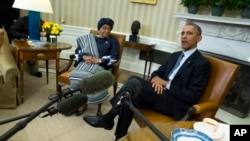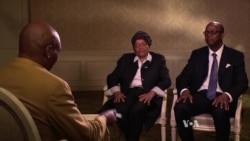Liberian President Ellen Johnson Sirleaf and the president of Africare, Dr. Darius Mans, spoke to VOA on Saturday about their meetings in the United States. The interview covered a range of topics, including the fight against Ebola, other health care challenges and the problem of migrants trying to cross the Mediterranean Sea to reach Europe.
Sirleaf said she visited the United States at the invitation of President Barack Obama to discuss the fight against Ebola and the progress made in her country and Guinea and Sierra Leone, the three countries hardest hit by the disease. She said Obama reassured her that the United States will continue to support her country as it embarks on its economic recovery plans.
Obama hosted Sirleaf and the presidents of Guinea and Sierra Leone at the Oval Office last week.
Sirleaf said she is hopeful that some of the $1.4 billion the United States has allocated to fight Ebola can be used to support the economic recovery program.
Sirleaf also met with World Bank officials, who agreed to provide $650 million to Liberia, Guinea and Sierra Leone over the next year to year and a-half to help them recover from the Ebola crisis.
She said the fight against Ebola showed problems with Liberia's health care system, that it did not have enough doctors and nurses in place and that all facilities were not up to date. She said Liberia needs to build a health system that has the "capacity to respond," and is working with the CDC and NIH and officials in Britain to develop that system.
Dr. Darius Mans said Africare has worked in Liberia since 1992 and is committed to the long-term there and in the other two countries most affected by Ebola, Guinea and Sierra Leone. He said Africare was able to work in the region to keep clinics open and treat people during the Ebola crisis, and has been involved in talks with all three countries for their recovery plans.
Sirleaf said that empowering communities to take ownership and responsibility in the fight against Ebola was one of her most important decisions. She added that going against her country's long established tradition and ordering the dead to be cremated was difficult, but that she believes it made a difference.
She also discussed African migrants who often perish in the Mediterranean Sea trying to reach Europe. She said countries must work together to fight poverty and address basic needs so the population will not try to make that dangerous journey.






